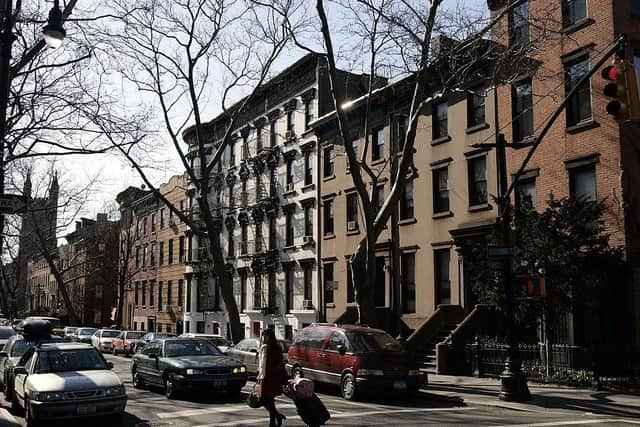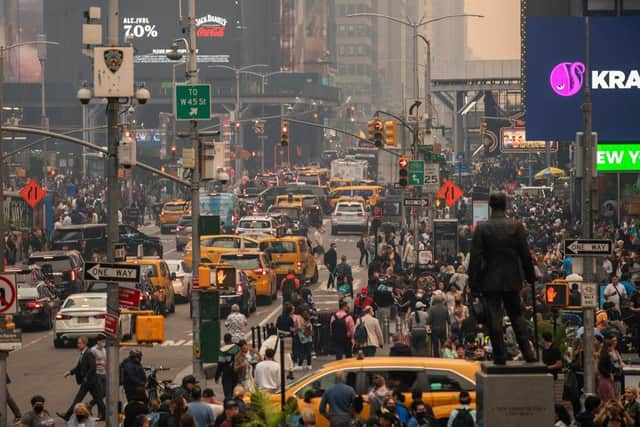Short-term let restrictions: How let restrictions have impacted on New York and what it could mean for Scotland
“People who are on a budget aren't going to come to New York any more.” It is the blunt assessment of Lisa Grossman, spokeswoman for Restore Homeowner Autonomy and Rights (RHOAR), a group of home owners in New York who previously let out properties as short-term lets.
Airbnb-style accommodation has essentially been banned in the US city, in a bid to crack down on disruptive “party flats” and return properties to the residential housing market.
Advertisement
Hide AdAdvertisement
Hide AdIn New York, the number of short-term lets listed on Airbnb plummeted by 77 per cent between May and September 10 – five days after the new regulations were brought in, in the city. The vast majority of properties previously operated as short-term lets are no longer legally allowed to do so, meaning huge swathes of accommodation options have been removed from the market overnight and tourists are almost entirely restricted to staying in hotel rooms.


The new rules are more stringent than those planned for Scotland – and have been met with angry opposition from property owners.
For Ms Grossman, whose lobby group is made up of people who rented out “granny flat” style accommodation attached to their own homes, living in New York has suddenly become less affordable.
"The councillors didn't think it all through,” she says. “They need to recognise that it's going to affect their home owners, they're going to potentially have lost their homes. Financially, a lot of people are dependent on short-term let income to keep their homes in New York City, which is a very expensive place to own a property. It just becomes unaffordable for average people to live here anymore.”
She points to soaring hotel prices, driven by high demand combined with a lack of accommodation options in the city. In Manhattan, a Hilton Garden Inn, which the hotel chain describes as its “mid-range” level of accommodation and which in Glasgow costs £77 a night this weekend, is currently listed for £711 a night.


"From a tourist perspective, it is not a good situation,” Ms Grossman says. “New York is definitely going to miss out. People with two or three kids will look at the price of two hotel rooms and go somewhere else. Since the restrictions came in, you can't rent a private space from anyone. The only option is to rent a bedroom in someone's house, which is really only suitable for a 20-year-old.”
Supporters of the scheme argue the new rules in New York have essentially taken Airbnb in the city back to its roots. Under the regulations, which came into force on September 5 and follow restrictions in cities including Barcelona, Paris and Amsterdam, hosts have to be present on the premises while a room is let out – and locks are not allowed on bedroom doors. In short, the accommodation essentially has to be a host’s actual spare room. They say the rules mean residents escape the stress, noise and disruption of so-called “party flats” – and rebuild their communities with a higher proportion of long-term residents.
However, others warn the restrictions take away a significant proportion of accommodation options, which not only pushes up prices for tourists, but deters those who do not want to stay in hotels and prefer to cook their own meals in a residential setting.
Advertisement
Hide AdAdvertisement
Hide AdChris Greenwood, senior research fellow at the Moffat Centre for Travel and Tourism at Glasgow Caledonian University, says entirely cutting out self catering options in New York will inevitably result in a drop off in visitors.


"A loss of stock impacts on these iconic destinations like New York,” he says. “But we also need to address the tourism backlash.
"Over the longer term, it may recalibrate. But in the short term, there may well be a drop in tourists. Firstly, you're going to have problems with availability of stock, so that's going to push up prices. Secondly, is choice. If you've removed a certain sector of your products, then there might be a problem. Some people don’t want to stay in hotels, they want the flexibility [of self catering].
"If people are going for a specific event, they may find it is really expensive and that may influence them in the future in selecting New York. They may think ‘I tried to go there and the prices were horrendous, I’ll go somewhere else next time’.”
Mr Greenwood adds: “At the end of the day, visitors like choice and are becoming increasingly cost conscious and want value for money. People like an experience now – it's not just buying a bed to sleep in, they want that broader understanding of a destination. Renting an individual’s home appeals to people and their sense of wanderlust.”


He warns operators may struggle to host large-scale events in cities which have no self catering accommodation on offer.
“The 2026 World Cup is being held in America, Canada and Mexico,” he says. “New York will be one of the sites that matches are held – and the question is, is there sufficient stock of accommodation to hold another number of fans that will be coming for that? Think of during the UCI cycling event in Glasgow this year. If 60 per cent of the accommodation stock had been removed, would that event have been able to be hosted there?”
Mr Greenwood says some cities with existing restrictions, such as San Francisco, have seen the creation of a large “underground” market of short-term let hosts.
Advertisement
Hide AdAdvertisement
Hide Ad"There was a drop-off in terms of the number of hosts [in these places], but then an underground system came in off the back of that,” he says. “Then, you've also got the tax revenue that's going to be lost, especially if it goes unregulated, because people who may have been paying into that won't be anymore.”
Fiona Campbell, chief executive of the Association of Scotland’s Self-Caterers, says New York’s experience should be a warning to politicians still pushing ahead with Scotland’s own short term lets legislation. Landlords have until October 1 to sign up for a licence.
Ms Campbell says: “The increase in hotel prices and shortage of accommodation in New York should come as no surprise. Indeed, it has already happened closer to home in Dublin. When the short-term let sector is over-regulated, the main beneficiaries are big hotel chains who profit through reduced competition, while small tourism businesses close and the average consumer is hit in the pocket.
“It might be a boon for hotels, but if the experience is replicated in Scotland, I fear not only for the self-catering sector, but related businesses in tourism and hospitality who benefit from our guest spend, as well as our country’s ability to host large-scale events which depend on the alternative capacity provided by short-term lets.”
She adds: “If unamended, the Scottish Government’s disastrous licensing scheme promises to cost jobs and livelihoods, push up the cost of holidaying in Scotland for ordinary families, and help businesses in the UK and Europe at our expense as visitors go elsewhere. We need to urgently pause and review the regulations before it is too late.”
Comments
Want to join the conversation? Please or to comment on this article.
